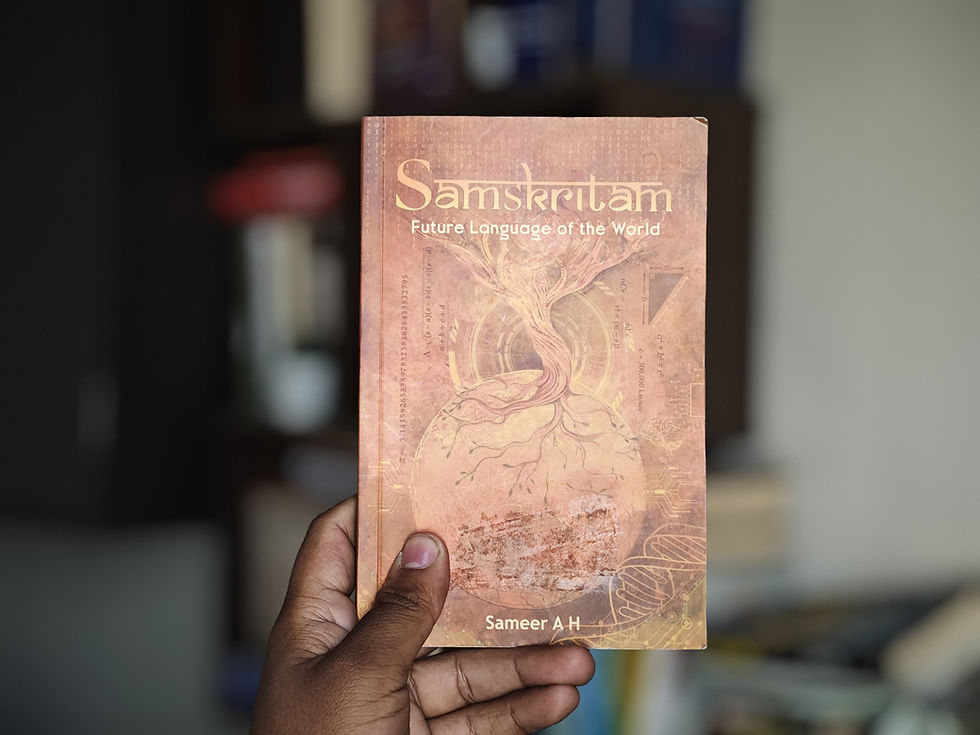The Dustbin Diaries Review: A Riveting Tale of Innovation and Academic Challenges
- Harsh Agrawal

- Jan 3
- 4 min read

The Dustbin Diaries
Author: Dr. Alok Gupta
Genre: Entrepreneurial and Innovation Fiction/Social Commentary
Published by Sambhawana Publication
Pages: 160
MRP: Rs.300/-
Purchase Link: https://amzn.to/40i7B2c
Dr. Alok Gupta’s The Dustbin Diaries is a compelling narrative that intertwines the technical challenges of innovation, the bureaucratic intricacies of academia, and the raw resilience of entrepreneurship. Published by Sadbhawana Publication, this novel explores the journey of Dhruv, a young inventor, and his ambitious project—a “smart automated dustbin.” At its heart, the book is a celebration of innovation and an insightful critique of systemic flaws in higher education and entrepreneurial ecosystems.
Themes and Context
At its core, The Dustbin Diaries captures the essence of innovation—the courage to pursue an idea against all odds. The protagonist, Dhruv, represents the unyielding spirit of youth, eager to challenge conventions and bring ideas to life. His invention, the automated dustbin, becomes a metaphor for modernity, efficiency, and environmental consciousness. Through Dhruv’s story, Dr. Gupta delves into deeper societal themes: the stifling bureaucracy of academic institutions, the importance of mentorship, and the ethical dilemmas in the entrepreneurial journey.
The novel also addresses the less glamorous side of education—grade manipulation, inadequate resources, and the politics that hinder genuine learning and innovation. These systemic issues are not merely subplots but integral to the story’s structure, adding depth to Dhruv’s challenges.
Characters
Dr. Gupta’s characters are vivid and multi-dimensional, each contributing uniquely to the narrative:
Dhruv: The protagonist is a determined and resourceful student whose journey reflects the trials of transforming a concept into a tangible product. His unwavering optimism and resilience serve as an inspiration for readers.
Garima: Dhruv’s younger sister brings a fresh perspective to the narrative, embodying the curiosity and enthusiasm of a new generation intrigued by innovation.
Firoz Ali: A mentor and patent agent, Firoz Ali’s role underscores the importance of guidance and technical expertise in navigating legal and financial hurdles. His presence lends credibility to the novel’s focus on intellectual property and entrepreneurship.
Professor Majumdar and Professor Anurag: These academic figures illustrate the contrasting roles of facilitators and experts in nurturing young talent.
Anupriya and Neha Malhotra: Representing ambition and rivalry, these characters add complexity by highlighting the personal and professional conflicts within the academic and entrepreneurial ecosystem.
Meena Matoli and Chirakut Lal: Their quirky personas infuse humor and light-heartedness into the narrative, making the story accessible and enjoyable.
Narrative Style
Dr. Gupta’s writing is a balanced blend of technical exposition and engaging storytelling. The novel’s structure alternates between Dhruv’s personal struggles and broader societal commentary. The author’s background as a patent agent and educator enriches the narrative, lending authenticity to the discussions around intellectual property, patent filing, and startup development.
Highlights
Authenticity in Depicting Innovation: The novel excels in portraying the iterative process of innovation. Dhruv’s journey, from conceptualizing the automated dustbin to overcoming technical failures, resonates with real-world challenges faced by inventors. The detailed descriptions of incubation centers, mentorship sessions, and patent processes provide valuable insights for aspiring entrepreneurs.
Critique of Academic Institutions: Through characters like the Chairman, Director, and Professor Majumdar, Dr. Gupta critiques the systemic inefficiencies of higher education. The manipulation of grades, misallocation of resources, and superficial emphasis on accreditation expose the grim realities of academia.
Mentorship and Teamwork: The significance of structured mentorship is a recurring theme. Firoz Ali’s role as a guide emphasizes the need for technical and legal knowledge in innovation. Similarly, the dynamics between Dhruv, Rohit, and other team members highlight the importance of collaboration.
Humor and Relatability: Characters like Meena Matoli and Chirakut Lal add a humorous dimension to the narrative. Meena’s eccentric culinary experiments and Chirakut’s outlandish inventions bring levity, making the technical discussions more engaging.
Social Commentary: The novel’s exploration of ethical dilemmas—from plagiarism in academia to the pressures of commercialization—adds depth. Anupriya’s manipulative tactics and the Chairman’s profit-driven mindset reflect broader societal issues, prompting readers to reflect on their values.
Challenges in the Narrative
While The Dustbin Diaries is an engaging read, certain aspects could have been explored further:
Character Development: While the primary characters are well-drawn, some supporting characters, like Mr. Mehra (the investor) and Professor Amar Prasad (the skeptic), could have been given more depth to enrich the narrative.
Technical Jargon: At times, the detailed discussions on patents and intellectual property might feel overwhelming for readers unfamiliar with the subject. Simplifying these sections or including a glossary could enhance accessibility.
Pacing: The novel’s pace occasionally slows during technical explanations, which might deter readers seeking a faster-moving storyline.
Impact and Takeaways
The Dustbin Diaries is more than just a novel; it is a call to action for aspiring innovators and a critique of systemic barriers. Dr. Gupta’s narrative demonstrates that innovation thrives not only on ideas but also on resilience, mentorship, and ethical integrity. The book encourages readers to question existing systems and embrace creativity, making it a valuable read for students, educators, and entrepreneurs.
In a world increasingly driven by technology and entrepreneurship, The Dustbin Diaries serves as a reminder of the human element in innovation. It celebrates the unsung heroes behind every invention and underscores the importance of perseverance in the face of adversity.
Conclusion
Dr. Alok Gupta’s The Dustbin Diaries is a remarkable blend of fiction, social commentary, and technical insight. It offers a nuanced exploration of the entrepreneurial journey, enriched by authentic details and relatable characters. Despite minor shortcomings in pacing and accessibility, the novel’s strengths far outweigh its flaws, making it a must-read for anyone intrigued by the intersections of innovation, education, and society.
With its engaging narrative and profound themes, The Dustbin Diaries is not just a story about a smart dustbin; it is a testament to the indomitable spirit of human ingenuity.
Purchase Link: https://amzn.to/40i7B2c



Commentaires